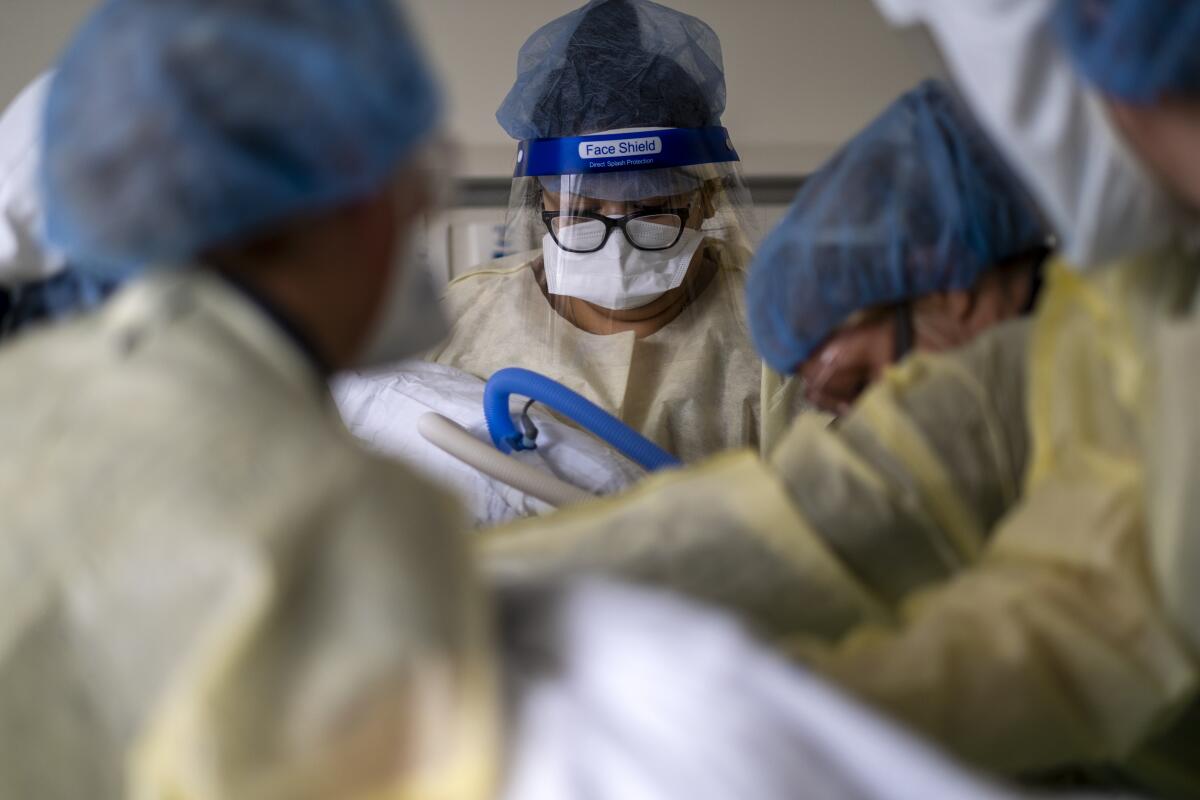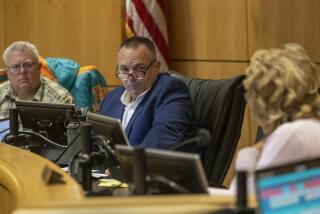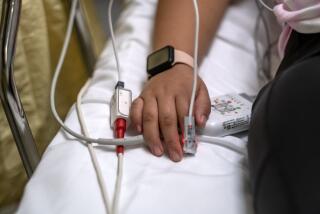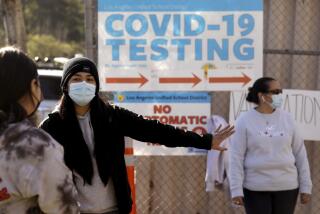Most California health workers got vaccinated, but holdouts could be fired

California’s aggressive push to vaccinate millions of healthcare workers against COVID-19 appears to have been mostly successful, with many hospitals and other healthcare facilities reporting overwhelmingly high rates of inoculated employees by the Thursday deadline.
Thousands of workers remain unvaccinated, either in defiance of the state’s order or through approved exemptions for medical or religious reasons. But the number of holdouts seems to represent a small fraction of the Golden State’s approximately 2.4 million healthcare workers.
The holdouts nevertheless represent a significant test for employers and public health officials grappling with how to apply the state’s new requirements, including how to ensure compliance from a vast network of health facilities.
Some hospitals said they plan to fire workers Friday; others are starting with suspensions. Most said they plan to offer grace periods to employees who change their minds. Several said they expected the state to give understaffed hospitals hit hard by the Delta variant a 45-day extension to allow administrators to make alternate staffing plans.
Well over 90% of employees at several healthcare providers across Southern California are in compliance with the order, including some workers who got vaccinated this week, administrators said. About 97% of Kaiser Permanente’s 216,000 employees have complied. Among the 7,500-person staff of USC’s health system, just two workers may lose their jobs.
“If this were an election, it would be a landslide victory in favor of getting vaccinated,” said Chris Van Gorder, chief executive of Scripps Health, which has nearly 17,000 employees and five hospitals in San Diego. He said about 140 employees, or 0.85% of the workforce, have not received an exemption or a vaccine and are scheduled to be fired Friday.
The story is different in more rural parts of California, where vaccination rates lag far behind the Bay Area and Southern California. The busiest hospital in Tulare County said that more than 30% of workers who care for patients had been granted exemptions, mostly for religious reasons. The Enloe Medical Center in Chico said 18% of employees had not been vaccinated.
At Adventist Health Kern County’s three hospitals in the Central Valley, the vaccine mandate boosted the inoculation rate among approximately 3,800 employees from about 60% to about 90%, said the network’s president, Daniel Wolcott.
California health officials are relying on employers to determine which workers are vaccinated and what will happen to those who are not. The state’s lack of data makes it difficult to determine how many workers are unvaccinated, how many received exemptions, and which facilities have high opt-out rates. The law applies to workers at hospitals and doctor’s offices, dialysis centers, drug treatment centers and other healthcare settings.
“This is a deadline we are watching closely and expect full compliance,” said state Department of Public Health director Tomás J. Aragón.
The state has not provided clear guidance on what should happen to employees who did not get the vaccine or an exemption. But Aragón said in a statement that employees can “continue to work” only if they have received a one-dose vaccine or both doses of a two-dose regimen by Thursday.
The state also did not tell healthcare providers how to evaluate medical and religious exemption requests, leaving employers to develop their own systems.
In Tulare County, the Kaweah Health Medical Center in Visalia is granting religious exemptions to every employee who requests one, fearing that a stricter approach could spur a massive staffing shortage.
“We cannot afford to lose a single nurse,” said Chief Executive Gary Herbst. The vaccination rate in Tulare is 43.3%, compared with 60% statewide, and the hospital is seeing a surge of COVID-19 patients, he said. The hospital is struggling with a high rate of turnover and exhaustion, and is relying on overtime from current staff and about 100 travel nurses to meet staffing demands.
The hospital is allowing employees to request a religious exemption without providing details, Herbst said. That lenient approach probably prevented a “mass exodus” of employees, as more than 800 employees submitted declinations, Herbst said.
The UC Davis health system also approved most religious exemption requests, in part to reduce the risk of lawsuits, said Chief Executive David Lubarsky. Employees were asked to explain how getting vaccinated would contradict their spiritual beliefs. He said they denied requests from people who simply disliked vaccines, or whose religious objections were based on misinformation.
Exemptions have also been a significant issue at other healthcare organizations. Dr. David Herbert, president and chief executive of Sutter Independent Physicians, an affiliate of Sutter Health, said some churches have seemingly been writing exemption letters “to all comers,” and some doctors have been writing what “appear to be unwarranted exemptions.”
“If the order had included a mechanism to verify medical and religious exemptions, it would have caused much less confusion,” Herbert said.
Dr. Jeffrey Smith, chief operating officer of Cedars-Sinai Medical Center, said the state’s leeway on how to grant exemptions was helpful, because “every healthcare provider is in a little bit of a different situation.” About 98% of the 17,000-person staff is vaccinated, he said, and about 1% received exemptions.
The hospital’s most common medical exemption was for employees who have recently had COVID-19, Smith said. They will have an additional 90 days to get vaccinated. He said the hospital decided that antibodies from the virus, combined with rigorous mask and testing requirements, should be sufficient to protect workers and patients in the short term.
In San Diego, Scripps approved medical exemptions for 42 pregnant staff members, Van Gorder said. The panel of physicians that considered the exemptions was “split” on the decision because the vaccines are safe during pregnancy, he said, but the hospital opted for a policy that will keep more people in their jobs. The employees will be required to get vaccinated when they return from parental leave.
About 3% of the 2,800-person staff at Saint Agnes Medical Center in Fresno has not gotten an exemption or a vaccine, said President and Chief Executive Nancy Hollingsworth. Those workers will not immediately be suspended Friday, but will have a two-week grace period to get vaccinated.
“Our goal is vaccination, not termination,” Hollingsworth said in a statement. The hospital’s parent company, Trinity Health, has 117,000 employees and a “large backlog in reviewing all the final documentation,” she said.
The mandate appears to be on solid legal ground, according to experts. While there will probably be lawsuits filed over the state’s vaccine mandate, the “vast, vast majority of judicial decisions” have upheld vaccine mandates, said Jessica Levinson, a professor at Loyola Law School in Los Angeles.
While most California doctors were vaccinated against COVID-19 months ago, the inoculation rate lagged among nurses, janitors, food service workers and other hospital employees. The looming mandate prompted many to get the shot.
“It was a ground war,” Lubarsky of UC Davis said. Vaccination rates among the health system’s roughly 15,000 workers had plateaued at about 80% earlier this summer, he said. The hospital sent trusted colleagues and supervisors to talk to unvaccinated colleagues, a strategy that Lubarsky said was “far more effective than me jabbering over an email.”
The hospital now has a 94% vaccination rate, with 5.7% claiming a religious or medical exemption. The remaining 0.3% of the staff, about 45 people, have not complied and will be banned from the grounds and suspended without pay Friday, Lubarsky said.
Finding another healthcare job in California may be an uphill battle, he said: “They’re going to have to have a vaccine or a valid exemption wherever they try to get hired.”
Officials and organized labor at Cedars-Sinai spent months improving the hospital’s vaccination rate, said Renée Saldaña from Service Employees International Union-United Healthcare Workers West, which represents nearly 100,000 healthcare workers in the state.
The union and the hospital arranged for a Black doctor to talk to food service and janitorial workers after seeing their relatively low vaccination rate, Saldaña said. About 98% of union members at Cedars are now vaccinated, she said.
Union steward Jose Sanchez, who works in transportation at Cedars, talked to his co-workers and helped them schedule vaccine appointments.
“It’s a good thing,” Sanchez said, adding that the mandate boosted vaccination rates. “I think everyone should get vaccinated — that way, we can start reaching some level of immunity and things can go back to normal.”
More to Read
Start your day right
Sign up for Essential California for news, features and recommendations from the L.A. Times and beyond in your inbox six days a week.
You may occasionally receive promotional content from the Los Angeles Times.








